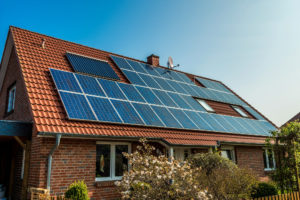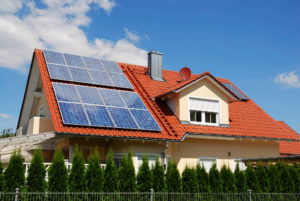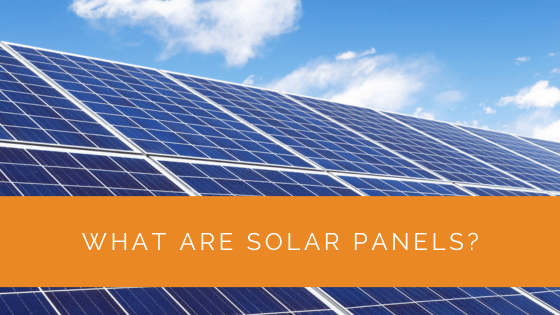Solar panels, often hailed as the cornerstone of renewable energy, have played an increasingly significant role in revolutionizing electricity generation. In this comprehensive guide, we will delve deep into the fascinating world of solar panels, providing a detailed exploration of their composition, functionality, and pivotal role in harnessing the abundant power of solar energy.
Contents
- 1 Key Takeaways
- 2 Solar Panel Basics
- 3 How Solar Panels Work
- 4 Types of Solar Panels
- 5 Solar Panels in Renewable Energy
- 6 Benefits of Solar Panels
- 7 Experience Solar Excellence with Us!
- 8 Case Study: Implementing Solar Panels for a Residential Home
- 9 Expert Insights From Our Solar Panel Installers About Solar Panels
- 10 Conclusion
Key Takeaways
- Solar panels are devices that convert sunlight into electricity through the photovoltaic effect, primarily using solar cells made of silicon.
- They play a pivotal role in harnessing renewable solar energy, reducing carbon emissions, and promoting energy independence.
- Solar panels come in various types, with solar photovoltaic (PV) panels and solar thermal panels being the most common, each with unique applications and advantages.
Solar Panel Basics
At the heart of solar panels lies a truly remarkable technology designed to capture and convert sunlight into electricity. Solar cells, the fundamental building blocks of solar panels, are the key to this incredible process. These cells, most commonly constructed using silicon, a highly efficient semiconductor material, can capture photons from the sun and initiate the photovoltaic effect, transforming solar energy into electrical power.
Composition and Structure of Solar Panels
Solar panels, as you might have seen on rooftops or solar farms, are comprised of many solar cells meticulously arranged in an organized array. The most prevalent type of solar cell is the photovoltaic (PV) cell, a marvel of materials science. These PV cells consist of silicon layers with specific electrical properties, working harmoniously to capture sunlight and convert it into electrical current.
How Solar Panels Work
Understanding the intricate workings of solar panels is crucial to appreciating their significance in renewable energy production. When sunlight strikes the surface of solar panels, it triggers the photovoltaic effect within the solar cells. This effect causes the electrons within the silicon layers to become energized, thus generating an electrical current. Initially, this current is in the form of direct current (DC).
To make this electricity compatible with our existing electrical systems, an essential component known as an inverter comes into play. The inverter’s role is to convert the DC electricity generated by solar panels into alternating current (AC), the standard form of electricity used in homes and businesses.

Types of Solar Panels
Solar panels come in various types, each tailored to specific applications and characterized by unique features. The two most prominent types are solar photovoltaic (PV) and thermal panels.
Solar Photovoltaic (PV) Panels
Solar PV panels, also referred to as solar photovoltaic panels, are the most prevalent and widely used type today. Renowned for their high efficiency in converting sunlight into electricity, these panels are common on rooftops and solar farms. Solar PV panels are constructed with interconnected solar cells, forming an array that efficiently captures sunlight and converts it into electrical power.
Solar Thermal Panels
In contrast, solar thermal panels harness the sun’s heat to generate electricity. These panels utilize sunlight to heat a fluid, which in turn drives a turbine connected to a generator. Although less common than PV panels, solar thermal panels excel in applications where simultaneous heat and electricity generation are required.
Solar Panels in Renewable Energy
Integrating solar panels into our energy mix is pivotal in achieving a more sustainable future. Solar arrays, composed of multiple solar panels, can be installed on a wide range of surfaces, including residential rooftops, commercial buildings, and expansive solar farms. These arrays play a vital role in generating electricity from the sun, reducing our dependence on non-renewable energy sources and significantly lowering greenhouse gas emissions.

Benefits of Solar Panels
Clean and Renewable Energy Source
Solar panels are celebrated for generating electricity without emitting harmful pollutants. This eco-friendly approach makes them vital to a clean and sustainable energy future. By harnessing the abundant energy from the sun, we can significantly reduce our carbon footprint and contribute to a greener planet.
Cost Savings
Investing in solar panels can lead to substantial long-term cost savings. Not only can you generate your electricity, but in many cases, excess energy can be fed back into the grid, providing financial incentives and reducing your energy bills.
Energy Independence
One of the most compelling advantages of solar panels is their energy independence. By generating your electricity, you reduce reliance on external energy sources. This enhances your resilience during power outages and provides greater control over your energy consumption.
Experience Solar Excellence with Us!
Trust in Solar Panels Network USA, where our seasoned experts deliver top-quality solar solutions for homes and businesses nationwide. With a legacy of countless successful installations and a commitment to sustainable energy, we’re your reliable partner in the solar journey. Ready for a brighter, eco-friendly future? Call us now at (855) 427-0058 and harness the power of the sun!
Case Study: Implementing Solar Panels for a Residential Home
Background
At Solar Panels Network USA, we frequently work with homeowners eager to transition to renewable energy. One recent project involved installing solar panels for a family aiming to reduce their carbon footprint and energy bills. This case study highlights the steps taken to provide a tailored solar solution that met their needs and expectations.
Project Overview
The family wanted a solar solution that would significantly offset their electricity consumption. After an initial consultation and site assessment, we proposed a system utilizing high-efficiency monocrystalline solar panels to maximize energy production from their available roof space.
Implementation
Assessing Energy Needs
We began by analyzing the family’s energy consumption patterns. This involved reviewing their electricity bills and understanding their daily energy usage. This assessment was crucial in determining the system’s size and configuration.
Designing the System
Based on the energy assessment, we designed a solar panel system that included:
- Solar Cells: We selected high-efficiency monocrystalline solar cells known for their superior performance and space efficiency. These cells were chosen to ensure maximum energy production within the available roof area.
- PV Modules: The solar cells were integrated into photovoltaic (PV) modules. These modules were tested for durability and efficiency, ensuring they could withstand environmental conditions and provide reliable performance.
- Inverter: To convert the DC electricity generated by the solar panels into AC electricity for home use, we installed a high-quality inverter. This component was selected for its reliability and efficiency in energy conversion.
- Mounting System: A robust roof-mounted system was used to securely place the solar panels. The mounting system was designed to withstand local weather conditions and ensure optimal panel orientation for maximum sunlight exposure.
Installation Process
- Site Preparation: The installation site was prepared by ensuring the roof was structurally sound and free of shading obstacles that could affect the panels’ performance.
- Component Installation: The solar panels were carefully mounted using the roof mounting system. Each component, from the PV modules to the inverter, was installed according to the design specifications to ensure secure and correct positioning.
- Wiring and Connections: We meticulously connected the solar panels to the inverter, ensuring all wiring was properly insulated and protected. The system was integrated with the home’s electrical infrastructure for seamless energy transition.
- System Testing: After installation, we conducted comprehensive testing to verify the system’s performance. We measured the energy output, checked the efficiency of the inverter, and ensured the overall system functioned as expected. Necessary adjustments were made to optimize performance.
Results
The solar panel system significantly reduced the family’s reliance on grid electricity. They experienced a noticeable decrease in their monthly energy bills and enjoyed the benefits of generating their clean energy. The system performed well in various weather conditions, demonstrating its reliability and efficiency.
Summary
This case study showcases the effectiveness of solar panels in providing a sustainable and cost-effective energy solution for residential properties. By carefully assessing energy needs, designing a tailored system, and ensuring proper installation and maintenance, Solar Panels Network USA delivered a solution that met the family’s goals. The project highlighted the environmental and financial benefits of adopting solar energy, demonstrating its value as a renewable energy source.
Expert Insights From Our Solar Panel Installers About Solar Panels
Solar panels are more than just a green energy solution; they’re an investment in the future. Their ability to convert sunlight into electricity without emitting pollutants makes them an essential component of sustainable living.
Senior Solar Installer
Understanding the different types of solar panels, such as monocrystalline and polycrystalline, is crucial. Each type has its advantages, and the right choice depends on specific energy needs and installation conditions.
Lead Solar Technician
Regular maintenance of solar panels ensures their longevity and efficiency. Simple steps like cleaning and routine inspections can significantly impact their performance and the overall return on investment.
Solar Installation Expert
Conclusion
Solar panels represent a remarkable innovation in the realm of renewable energy. They capture sunlight through solar cells, initiate the photovoltaic effect, and transform it into usable AC power through an inverter. The environmental benefits of solar panels are undeniable, and they offer substantial cost savings and energy independence to individuals and businesses alike.
As we continue to explore and develop solar technologies, the future of renewable energy shines brighter than ever. Solar panels are at the forefront of this transformation, harnessing the boundless power of the sun. By embracing this technology, we take significant steps toward a greener, more sustainable world, leaving a lasting legacy for future generations.
By comprehensively understanding solar panels and their pivotal role in renewable energy production, we empower ourselves to make informed decisions about adopting this clean energy source. Solar panels are more than just an assembly of cells; they represent the gateway to a cleaner, more sustainable future for us all. Embracing this technology is crucial in our journey toward a greener planet and a brighter tomorrow.
About the Author
Solar Panels Network USA stands at the forefront of solar energy solutions, driven by a team of seasoned solar engineers and energy consultants. With over decades of experience in delivering high-quality solar installations and maintenance, we are committed to promoting sustainable energy through customer-centric, tailored solutions. Our articles reflect this commitment, crafted collaboratively by experts to provide accurate, up-to-date insights into solar technology, ensuring our readers are well-informed and empowered in their solar energy decisions.

